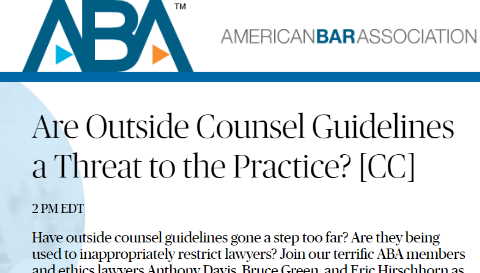Covid, Remote Work + Professional Ethics — Pennsylvania Bar Issues “First of Its Kind” Opinion
Posted on
Hat tip to Max Welsh, risk consultant at InOutsource and member of the State Bar of Wisconsin’s Standing Committee on Professional Ethics for noting: “Pennsylvania Bar Issues First Opinion on Remote Work Amid Crisis” —
- “Client data confidentiality is paramount while lawyers and law office staffers work remotely during the coronavirus pandemic, the Pennsylvania Bar Association said in an opinion written to address ethical concerns voiced by lawyers ordered to close their offices.”
- “The opinion is the first of its kind to be released by a state bar, although others including Michigan and Oregon have issued ethical guidelines for attorneys.”
- “‘The COVID-19 pandemic has caused unprecedented disruption for attorneys and law firms, and has renewed the focus on what constitutes competent legal representation during a time when attorneys do not have access to their physical offices,’ the bar’s legal ethics committee said April 10.”
- “The committee pointed out that while the issue of remote work isn’t new, and past ethics opinions have addressed related topics like technological competence, many attorneys and staff weren’t prepared to work from a home office once the state’s stay-at-home order went into effect, prompting the opinion.”
- “Some ‘reasonable precautions’ for lawyers and staff to take to protect confidentiality under professional ethics rules include:
- Requiring the encryption or use of other security to assure that information sent by electronic mail are protected from unauthorized disclosure;
- Using firewalls, anti-virus and anti-malware software to prevent the loss or corruption of data;
- Requiring the use of a Virtual Private Network or similar connection to access a firm’s data; and
- Requiring the use of two-factor authentication or similar safeguards.”
On the topic of encryption and security, Max referenced several stories we’ve noted on the potential perils of Zoom conferencing. (I’ve stopped covering each update, but in the past weeks: India, Siemens, Standard Chartered Bank, Google, the German government and US Senate have joined the growing ranks of banners.)
We’re both wondering how law firms are responding… and the extent to which client OCGs may apply as well… If anyone has personal or anecdotal updates on this front to share (with or without attribution), I’m all ears…
And I note the irony that the Pennsylvania Bar appears to be using Zoom for today’s presentation: “The COVID-19 Crisis: A Conversation with the PBA President and Leadership” and the virtual social hour scheduled to follow…









